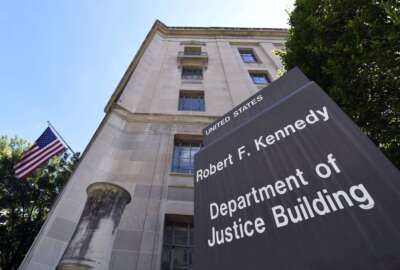OMB: Prepare for 3% federal pay raise
OMB said in its updated Circular A-11 guidance that the President will make a final decision about the federal pay raise, but agencies should start with 3%.
- The Biden administration is telling agencies to prepare for a 3% federal civilian pay raise in fiscal 2026. The Office of Management and Budget said in its updated Circular A-11 guidance that the President will make a final decision, but agencies should start with 3%. Additionally, the Defense Department and other agencies should consult with their OMB representative on the provisional estimate for the military pay raise for 2026. The annual update to Circular A-11 details the requirements for putting together the annual submissions, which are due to OMB by September. OMB said the thousand page guidance is largely unchanged from last year with only a few technical or clarification changes. (Circular A-11 - Office of Management and Budget)
- Federal agencies are trucking along with the Biden administration’s AI to-do list. The White House said agencies met each of the 270-day deadlines in the Biden administration’s sweeping AI executive order. Meanwhile, the administration expects to hire at least 500 AI experts into government by the end of fiscal 2025. The White House says agencies have made over 200 AI hires to-date through its AI talent surge. Senior White House officials also briefed President Joe Biden on national security issues related to AI and AI R&D.
- The Americans with Disabilities Act turns 34 years old. The landmark civil rights law prohibits discrimination against people with disabilities in employment, public accommodations, and state and local government services. To commemorate the occasion, the Biden administration is highlighting some of its accessibility work. In December, the Office of Management and Budget issued a government-wide policy to agencies to improve the federal government’s digital accessibility. And earlier this month, the General Services Administration issued a final rule to improve the accessibility of federal buildings.
- The Justice Department said a hacking group tied to North Korea’s military gained access to systems at NASA and at least two U.S. military bases. An indictment unsealed late last week charges one specific member of the group with laundering money to fund the hacking operation. Prosecutors said the attackers had access to a NASA system for more than three months, and stole more than 17 gigabytes of data. Systems at Randolph Air Force Base in Texas and Robins Air Force Base in Georgia were also compromised.(North Korean charged in cyberattacks on US hospitals, NASA and military bases - Associated Press)
- The Department of Health and Human Services is hiring for a new chief technology officer, chief data officer and chief artificial intelligence officer, and then placing them into a new office called the Assistant Secretary for Technology Policy and Office of the National Coordinator for Health IT. HHS Secretary Xavier Becerra said National Coordinator Micky Tripathi will lead this new office. Additionally, HHS is moving its public-private sector healthcare cybersecurity effort, known as the 405(D) program, into its Administration for Strategic Preparedness and Response and out of the Office of the Assistant Secretary for Administration. This reorganization is trying to address both policy and operational challenges around data and technology.
- President Joe Biden tapped Air Force Major General Jennifer Short to serve as senior military assistant to the Defense Secretary. If confirmed, Short would be promoted to the rank of lieutenant general. Short is currently serving as the legislative liaison director at the office of the Air Force Secretary. In her role, Short works directly with Congress to ensure full authorization of the service’s annual budget. Prior to her current role, she served as the strategic planning and policy deputy director at the Indo-Pacific Command.(Biden nominates next senior military assistant to Defense Secretary - Defense Department)
- President Joe Biden tapped Air Force Lt. Gen. Steven Nordhaus to be the next chief of the National Guard Bureau, a little over a week before Gen. Daniel Hokanson, the current chief, officially leaves federal service. The President’s pick for the top position in the Guard was sent to the Senate right before a month-long recess. It’s possible the Senate Armed Services Committee holds a confirmation hearing for Nordhaus this week, but the National Guard Bureau is preparing for various outcomes.(National Guard preparing for possible leadership lapse - Federal News Network)
- Younger federal employees have a new investment option in the Thrift Savings Plan. The TSP board officially launched a new lifecycle fund on Friday. The fund is mainly meant for feds currently in their early 20s, who will retire roughly around the year 2068. The TSP's L funds generally track target-date retirement funds. They're designed to invest an entire portfolio into a diversified mix of other TSP funds. The TSP board will also soon wind down its L 2025 fund.(A new Lifecycle Fund is now available - Thrift Savings Plan)
- The Office of Personnel Management has finalized a rule to remove a time limit on higher pay rates for temporary work assignments. Previously, feds could only earn higher pay for higher level work for up to four months. OPM’s new final rule removes that cap, allowing feds to now get paid the higher rate for as long as the work goes on. Along with the final regulations, OPM published a Q&A to answer questions about how and when the new rules apply.(Revised regulations on time limited promotions - Office of Personnel Management)
- The Education Department is taking action after its inspector general found online student aid accounts were susceptible to fraud. In a new report, the IG found more than $27 million was disbursed to suspected fraudulent Federal Student Aid ID accounts. The IG said fraudsters could take advantage of weaknesses in the FSAID program to create fake accounts. The audit also found data reliability issues with the National Student Loan Data System. The Education Department agreed to implement most of the IG’s recommendations. (Federal Student Aid’s actions to mitigate risks associated with the FSA ID account creation process - Department of Education OIG )
- The Cybersecurity and Infrastructure Security Agency said AI can enhance existing vulnerability detection software, but not completely replace those tools. That’s one takeaway from the agency’s recent AI testing. CISA plans to continue monitoring the market to see how AI cybersecurity capabilities improve in the coming months and years. The agency’s pilot is part of the Department of Homeland Security’s recent actions under President Joe Biden’s AI executive order.(DHS deploys pilot programs, expands efforts to leverage AI to secure nation’s critical infrastructure - Department of Homeland Security)
Copyright © 2024 Federal News Network. All rights reserved. This website is not intended for users located within the European Economic Area.
Daisy Thornton
Daisy Thornton is Federal News Network’s digital managing editor. In addition to her editing responsibilities, she covers federal management, workforce and technology issues. She is also the commentary editor; email her your letters to the editor and pitches for contributed bylines.
Follow @dthorntonWFED






